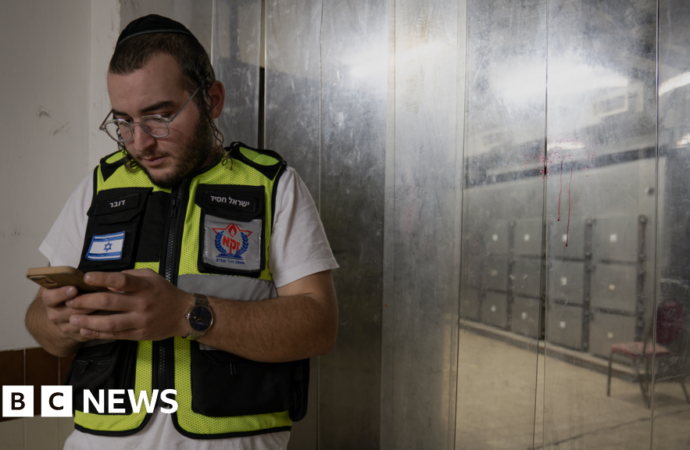Zaka: Volunteers Preserving Dignity in the Face of Tragedy
Introduction:
In a recent devastating attack by Hamas in Israel, a religious organization called Zaka played a crucial role in the aftermath. Zaka is responsible for collecting the remains of the deceased, including blood, ensuring they are buried in accordance with Jewish religious law. Comprised of ultra-orthodox Jewish volunteers, Zaka has been involved in some of the most challenging and traumatic events, from natural disasters to acts of terrorism. This article explores the selfless dedication of Zaka volunteers and their commitment to providing dignity to the dead.
Body:
1. The Unseen Work of Zaka:
Behind the barbed-wire gates of a military base in central Israel, Zaka volunteers diligently worked alongside soldiers, police officers, and forensics experts. The task at hand was the mass identification of the victims of Hamas’s murderous attack. While the public remained unaware, Zaka volunteers donned their bright yellow vests, ready to perform their tough responsibilities.
2. Collecting Remains with “True Grace”:
Zaka’s primary duty is to collect every part of the deceased, including blood, so that proper burial can be conducted according to Jewish religious law. The organization is called upon to handle traumatic events such as natural disasters, suicides, and acts of terrorism. Their motto, “true grace,” emphasizes their commitment to ensuring that all available remains are collected and buried together.
3. The Call to Action:
When the attack occurred, Zaka volunteer Baroch Frankel was observing the Sabbath, as is customary in orthodox Jewish communities. Upon receiving a message on his Zaka walkie-talkie, Frankel learned about the emergency but could only fully comprehend the scale of the attack after sundown. He wasted no time, grabbing his essential kit and rushing to the scene. Frankel’s dedication exemplifies the selflessness and urgency with which Zaka volunteers respond to crises.
4. The Challenging Task:
Zaka volunteers have been tirelessly working at various attack sites, retrieving bodies in two-hour shifts due to the physically and emotionally demanding nature of the work. Dealing with the remains of children has been particularly distressing for Frankel and his fellow volunteers. The scenes they encountered were unimaginable – burned children, victims of explosions, and families brutally attacked in their homes. Frankel vividly recalls the haunting images that still linger in his mind.
5. A Sacred Service:
Despite the praise they receive from the public, Zaka volunteers remain humble. Frankel emphasizes that Zaka is a sacred service that requires no thanks because the dead cannot repay them. Their commitment to preserving dignity and adhering to religious customs during the most challenging moments sets them apart.
Conclusion:
The work of Zaka volunteers in Israel is a testament to their unwavering dedication to preserving dignity in the face of tragedy. Their tireless efforts to collect every part of the deceased and ensure proper burial according to Jewish religious law demonstrate the importance of their mission. Zaka volunteers, like Baroch Frankel, serve as an inspiration to us all, reminding us of the selfless acts of kindness and compassion that can arise even in the darkest of times.









